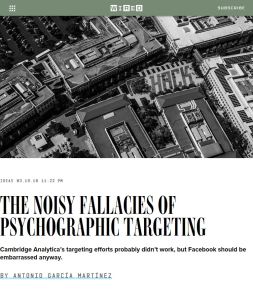Join getAbstract to access the summary!

Join getAbstract to access the summary!
Antonio García Martínez
The Noisy Fallacies of Psychographic Targeting
Cambridge Analytica’s targeting efforts probably didn’t work, but Facebook should be embarrassed anyway.
Wired, 2018
What's inside?
Psychographic targeting may not be as effective as most people believe.
Recommendation
Facebook lost billions of dollars in market value after it became public knowledge that Cambridge Analytica, a data firm that worked for President Donald Trump’s 2016 election campaign, harvested data from millions of Facebook users and used the information to change the outcome of the election. The data breach has created such public outrage that few people have questioned the scandal’s underlying assumption: that Cambridge Analytica’s voter targeting campaign succeeded at influencing voters. Antonio García Martínez, a former product manager at Facebook, doesn’t believe it did – and explains the reason for his skepticism in an opinion piece for Wired. getAbstract recommends his analysis to advertising industry professionals and anybody interested in questioning the conventional wisdom in a rapidly evolving news scandal.
Summary
About the Author
Antonio García Martínez is a tech entrepreneur, best-selling author, and an Ideas contributor for Wired.
















Comment on this summary